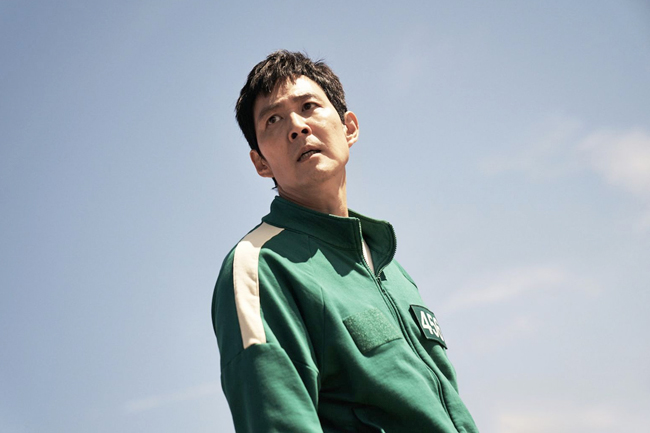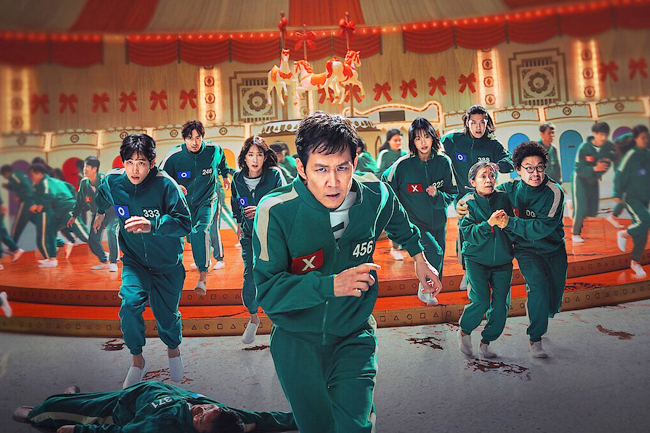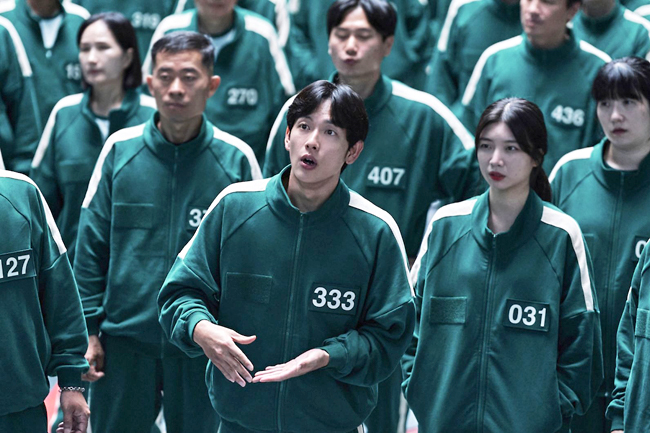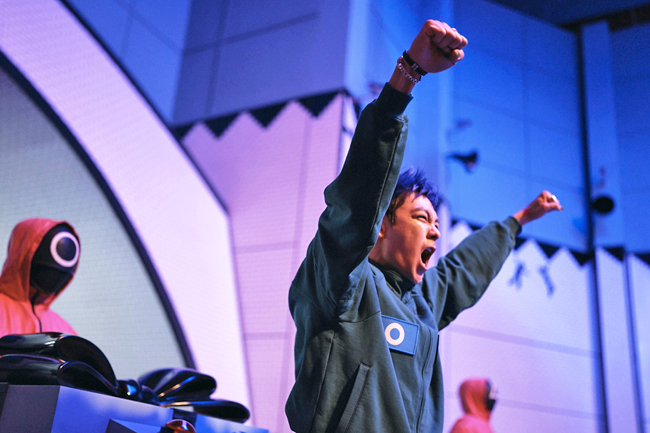ANN/THE KOREA HERALD – “This money is stained with the lives lost in that game.”
The weight of survival clings to Gi-hun (Lee Jung-jae) as Netflix’s global phenomenon Squid Game returns for its second season. Three years after his harrowing victory in the deadly competition, Gi-hun is driven by more than vengeance – he feels a moral duty to dismantle the twisted games once and for all.
Season two marks a significant tonal shift from its predecessor. The raw desperation of debt-ridden contestants from the first season is replaced by a cold resolve and unshakable guilt. Gi-hun, now armed with his fortune, channels his resources into tracking down the game’s elusive architects. Along the way, he assembles a shadowy crew of mercenaries and finds an unlikely ally in detective Jun-ho (Wi Ha-jun), who survived his dramatic fall in season one and returns with a mission to uncover the truth about his brother, the enigmatic Front Man (Lee Byung-hun).
Gi-hun’s calculated infiltration plan, reminiscent of the vengeful intensity of Oldboy (2003), sees him retreat to a grimy motel in self-imposed isolation. Yet, as the adage goes, “Everyone has a plan until they’re punched in the mouth.” When a mole exposes his scheme, Gi-hun is forced to return to the games – this time not as a participant seeking survival, but as a reluctant guide, determined to lead his fellow contestants toward redemption.
The series retains its iconic elements: the candy-coloured death traps, visceral gore splattering pastel sets, and the haunting animatronic doll presiding over Red Light, Green Light. Yet beneath the familiar brutality lies a deeper, more introspective narrative. Season two shifts from the relentless nihilism of its debut to explore weighty questions about collective will, moral responsibility, and the fragile bonds that can form – or break – under unthinkable pressure. As Hwang promised in prerelease interviews, the voting system emerges as the season’s psychological core, generating as much suspense as the deadly games themselves.




Participants now wear badges showing their voting choice, with a crucial twist: Voting to end the games means splitting the prize money among survivors rather than compensating victims’ families.
This new element adds layers of moral calculation to every move, each episode turned into a quasi-political theatre as alliances form and fracture. Long sequences devoted to persuasion, blackmail and inner turmoil might alienate viewers seeking pure adrenaline, but they certainly do create a different kind of tension.
Here, the real psychological drama lies in watching contestants choose their own destruction one round after another, voting to continue despite impossible stakes – a reflection of human nature more disturbing than any physical violence.
The motivations behind each vote are, understandably, complex. For many, desperation makes death in the games preferable to life outside, a point the show drives home repeatedly.
Yet the series takes a clear moral stance – those committed to ending the games emerge as an unmistakable force for good even through moments of doubt, and viewers are relentlessly encouraged to root for their cause.
This moralising voice finds its heart in a richly drawn supporting cast. Hwang once again proves his strength in bringing marginalised narratives to the fore – from Hyun-ju (Park Sung-hoon) to an inseparable mother-son pair (Kang Ae-sim and Yang Dong-geun) and Jun-hee (Jo Yu-ri), a pregnant woman abandoned by her child’s father (Im Si-wan).
Unlike season one’s concentrated burst of melodrama in the marble game episode, their narratives and interactions flow organically throughout. This approach culminates in episode four’s team challenge, where the extended camera takes against the background of Shin Hae-chul’s rock anthem To You capture a rare moment of unity – even those who chose to prolong the bloodshed find themselves rooting for their rivals’ survival.
The antagonists, too, evolve beyond one-dimensional thuggery, though in quite unexpected ways. Choi Seung-hyun plays Thanos, a rapper whose performative gangsterism and random English outbursts play like an SNL sketch. It’s a bizarrely memorable turn for the former BigBang rapper, an insufferable cringe-bomb that seems destined for meme status. Adding to the theatrical villainy is Seonnyeo (Chae Guk-hee), a strident shaman who manipulates vulnerable contestants with her sinister prophecies, echoing the fanatical Mrs Carmody from The Mist (2005) in her grotesque repulsiveness.
Meanwhile, Lee Byung-hun’s Front Man becomes an enigmatic presence inside the games, one that is simply impossible to ignore. Formerly the villain-in-chief who coolly oversaw the carnage, he now enters the game as participant number 001 and positions himself as Gi-hun’s closest ally and confidant. Lee’s stone-faced performance is a masterclass in ambiguity, keeping viewers constantly guessing at his true intentions. His nuanced portrayal sustains the show’s momentum throughout, leaving audiences perpetually questioning: What is he thinking? Whose side does he really belong to? Is he genuinely convinced by Gi-hun’s cause or orchestrating a high-stakes subterfuge?
Of course, not every addition lands. A subplot featuring No-eul (Park Gyu-young), a North Korean defector working as one of the games’ masked executioners, feels precariously close to a rehash of season one’s Sae-byeok. The sharp-dressed recruiter (Gong Yoo) delivers an electrifying portrayal of madness, but frustratingly appears only in the first episode, with his back story largely reduced to expository dialogue. The parallel storyline of Jun-ho’s commando operation abruptly falters through a lame twist involving an internal mole. These are minor stumbles in an otherwise promising evolution of the show’s scope.
Season two of Squid Game ends with more unresolved questions than answers. As such, it squarely positions itself as the middle chapter of a trilogy (season three, already filmed, arrives mid-2025).
For now, Squid Game seems to have drifted away from a visceral display of violence and towards something potentially more interesting: A test of whether humanity’s better angels can prevail in a deranged system designed to crush them. Whether Hwang Dong-hyuk ultimately delivers a triumph of human resilience or a cynical vision that dangles hope only to snatch it away, remains to be seen. – Moon Ki-hoon


